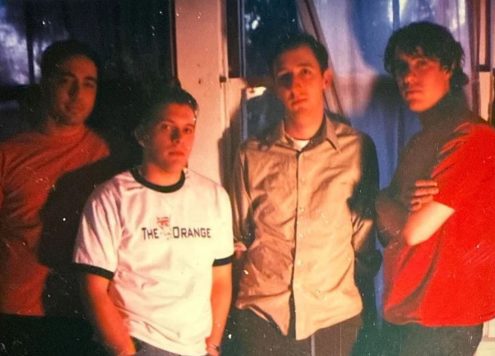There’s no clever rant here, just another week of relentless purging of my soul, album streams, and reviews. I’ve come to understand that with forced change comes growth. Insurmountable growth. We should never battle with change but when it’s unexpected, pick yourself up and throw your hands all in. It’s all worth it.
Ty Segall’s 2018 album Freedom’s Goblin was yet another testament of his ability to do something different every time, but do it in a way that is unmistakably Ty Segall. While not trying to reinvent his sound with each release, Freedom’s Goblin just did it organically. The biggest contributing factor was the particular lineup that recorded the album. Segall has played with a
This brings the Freedom Band into the spotlight as they play through various selections throughout Segall’s expansive discography. With the one and only Steve Albini handling engineering duties, this captures the raw energy of the band in a live setting, but the mix still feels like a studio album. I suppose that could be attributed to either Albini’s reputation as a recording
Facebook | Instagram | Twitter
The English/American collective of The Mekons has been going strong for over 40 years now(!) and there’s no sign of slowing down. Now with over 20 full-length albums under their belt, these alt-country cow punks continue to rage as only they know how. The band’s new Deserted (Bloodshot Records) is a stormy affair, with flare-ups and steady downpours.
The band opens with “Lawrence of California” and it makes me think the Mekons are to the UK what the Dropkick Murphys are to Boston; completely anthemic. While neither band sounds remotely alike, the song has that same appeal that draws one in, fist pumping and colliding into other. But with the Mekons, it’s much friendlier and done with handshakes because they are after all, ladies and gentlemen. That’s as far as any similarity would go. Now while the band has been labeled as alt-country at times – and of course it’s because of the band’s love of that music – it doesn’t hold a lot of weight here. Sure there are semblances of it on tracks now and again but there’s much more to Deserted than being held down in one spot.
There are tracks where the band harkens back to yesteryear like on “How Many Stars” as the song draws on English punk although filtered through modern Americana. The blend is astonishing, while “In The Desert,” plays with varying instrumentation and captures a different element altogether, altering the Mekons fabric for something unique with interesting percussion. The band just doesn’t stick to one pattern, which is fine because every song identifies as the Mekons, and that’s not easily accomplished. “Weimar Vending Machine,” is dark and brooding while the alt-country feel of “Andromeda” is catchy and fun. With Deserted the Mekons give listeners a lot to play with but in whichever direction the band takes you on, it’s going to be an enjoyable one. – Eddie Ugarte
Facebook | Instagram | Twitter
There’s a lot that goes into White Denim’s sound and style they’ve mastered over the course of 14 years, 9 albums, and getting lumped into multiple genres, all of which brings it back to the common denominator: rock. On the Austin, Texas’ band’s new Side Effects (City Slang), for good or bad, they’ve dissected everything ever learned, forced down their throats, and shoved it right into these 9 tracks.
The science of density and mass is usually associated with the physical but it’s easily relatable with Side Effects because this album is packed tightly together with so much energy encompassing every track. For the most part, tracks move at a quick pace but that’s not before the quartet beats listeners to death with an extensive array of sound culled from palettes of colorful imagery. It would be much too easy to label the band as progressive but the bounce of each track showcases the band’s punk leanings. “Shanalala” wraps around a steady beat the band capitalizes on, but they flagrantly throw caution to the wind, allowing bass and vocals to challenge those distorted guitars. And then there’s “NY Money,” with keyboard work incorporated with the track that harkens back to Genesis, King Crimson, and the like but the track is as contemporary as it gets and clocks in at almost 7-minutes long. They ride the rhythm until the very end.
Side Effects strays from allowing the band to fall into trappings of just another jam band, although tracks may seem that way, much like Cream did back in the late 60s, but they piece tracks together to form the songs that naturally progress, much like the instrumental “Reversed Mirror.” The band is simply insane with its constructs. If listening to “small talk (feeling control)” doesn’t give you an idea of the band’s psychotic ways, nothing will. They move at a frenetic pace, stopping in and out at varying moments, only to keep the consistency of the track, never losing itself within the song itself. “Hallelujah Strike Gold” is the epitome of classic rock done well while living in the future of 2019. White Denim leaves me in awe here, mouth agape and all. I’m not sure where they’re going from here but I’m willing to get on their bus for the ride. – Eddie Ugarte
Facebook | Instagram | Twitter
Hanging off the fringes of no particular genre it seems, is J Hacha De Zola. The NY/NJ resident just released his fourth album Icaro Nouveau (Caballo Negro) which falls so far out of the box, for good or bad, there’s no one around left to hit him with any sort of healthy competition. Not that there’s a need for it because as far as musical landscapes go, it’s a large playing field. But I digress.
It’s always my attempt to stray from comparisons because they’re as cheap as off the shelf liquor can be but here, it just might be necessary in order to give anyone a semblance or recognizability. First and foremost, Icaro Nouveau could be the soundtrack to a demented Lemony Snickett book, encapsulated within sour cotton candy balls, led by the demented ringmaster J Hacha De Zola mimicks; post-death. And that’s all within the opening track of “Anarchy,” filled with slinky horns as Zola confesses about being down with the anarchy. But it’s Zola’s own description of his music handlings (Urban Junkyard, Baroque Pop, Avant-indie, Downtown goth, Booze-gaze, Anti-folk, Folk noir). That isn’t too far off, but he shares some of the same attributes with groups like World/Inferno Friendship Society on “El Chucho (Hooko),” then shifting to aged Celia Cruz on a weekend “On A Saturday,” and even to lesser-known moments ala David Ouimet’s Motherhead Bug on “Hollow Trees.” So, tossing in other styles like Gypsy Punk and Dark Cabaret might be in order as well.
Zola doesn’t risk travelling through paths already worn, instead he opts to place his interests coveting and holding steady on holy ground tread most notably by Tom Waits. And like Waits, Zola will layer his music, ever so slightly like on “Ode To Ralph Carney” that you may miss everything that’s going on pieced together so. At times the music is ever so delicate, take “A Song For Her” for example. The light percussion is what’s so enjoyable, and when guitars swim in and out, it’s even more delectable.
I’m entranced by Icaro Nouveau, with its intricacies that abound left and right. On the closing “Hacha’s Lament” you may have to shut things down quickly before the darkness surrounds your very soul. Just well fucking done. – Eddie Ugarte











Social Media